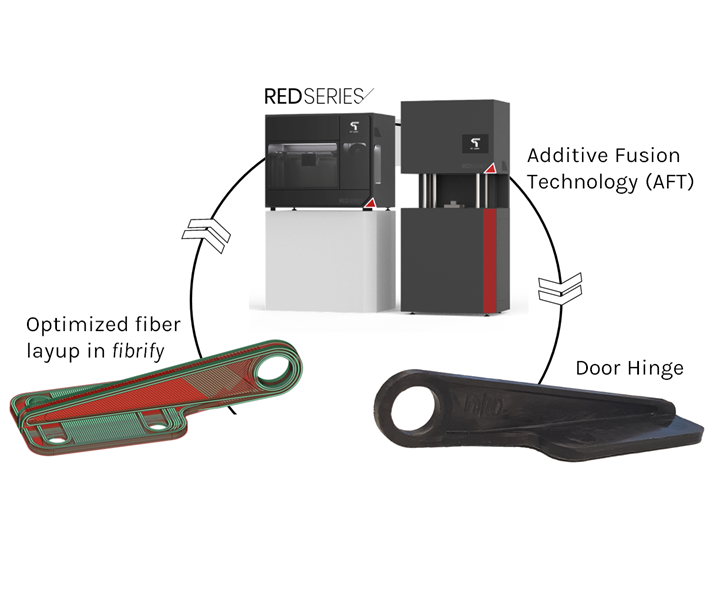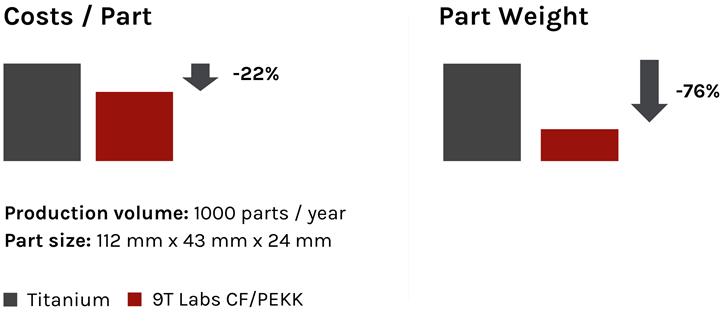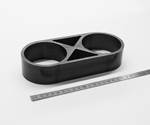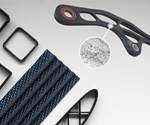9T Labs, Arkema present new manufacturing approach for small aerospace parts
The companies demonstrate cost-competitive series production of structural composite parts using carbon fiber/PEKK materials and additive manufacturing.

Source | 9T Labs
9T Labs (Zurich, Switzerland), a system provider for digital composite production, and high-performance polymer supplier Arkema (King of Prussia, Pa., U.S.) announced on May 2 that they recently partnered to enable cost-competitive series production of structural composite parts with complex internal fiber orientation. According to 9T Labs, the approach includes a combination of carbon fiber composite materials based on Arkema’s high-performance Kepstan 7000 PEKK thermoplastic polymer and 9T Labs’ recently introduced Red Series additive manufacturing solution.
In contrast to the high utilization of fiber reinforced composites in primary fuselage and wing applications on new airplanes like the Airbus A350 and Boeing 787, the aerospace industry still heavily relies on metal parts for smaller and thick internal substructures such as connection brackets, hinges and supports, 9T Labs says.
The company says that fiber composite materials are a favorable alternative for the metal materials used, enabling significantly lighter part designs and a near net-shape manufacturing, but that conventional composite manufacturing technologies fail to provide the geometrical complexity and the economics required to make them a viable contender for metal substitution in these small aerospace parts.

Source | 9T Labs
To prove the technology, 9T Labs and Arkema recently manufactured a helicopter door hinge to demonstrate the potential of the material/process combination for metal substitution in aerospace parts. Using the 9T Labs’ fibrify software, an integrated finite element analysis (FEA) solution, an optimized fiber layup with a true 3D internal fiber orientation was generated and subsequently manufactured using 9T Labs’ proprietary Additive Fusion Technology (AFT). As a result, 9T Labs says the weight of the optimized fiber composite part was reduced by more than 80% compared to the metal component. Furthermore, cost-per-part calculations revealed a 22% cost reduction for a series of 1,000 parts, 9T Labs says, demonstrating the economic viability of the Red Series solution for series production.
9T Labs says the Red Series is available for orders now.
Related Content
-
ASCEND program completion: Transforming the U.K.'s high-rate composites manufacturing capability
GKN Aerospace, McLaren Automotive and U.K. partners chart the final chapter of the 4-year, £39.6 million ASCEND program, which accomplished significant progress in high-rate production, Industry 4.0 and sustainable composites manufacturing.
-
Aurora reveals latest SPRINT X-Plane design concept
An Aurora and Boeing team advances its high-speed, vertical lift concept to the preliminary design phase, which features three lift fans, a more refined composite exterior and an uncrewed cockpit.
-
Optimized rib-reinforced hollow composites via printed molds
Addyx topology optimization and water-soluble mandrel enables simultaneous rib and skin layup for one-shot, high-strength, lightweight structures.

.jpg;width=70;height=70;mode=crop)












